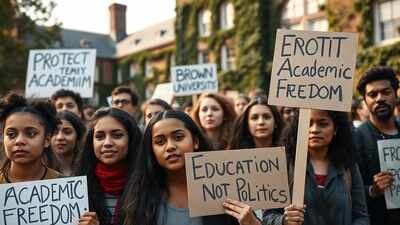Public money, private rules, no accountability? Rufo challenges MIT’s rejection of reform compact

Christopher F. Rufo, a prominent conservative activist known for his campaign against Critical Race Theory, has criticised the Massachusetts Institute of Technology (MIT) for rejecting a federal proposal called the “Compact for Academic Excellence in Higher Education.” Rufo argued that MIT’s claim of independence is invalid because the university receives billions in taxpayer funding, which, he says, should come with reciprocal duties and obligations.In a public statement, Rufo said the Trump administration’s compact is “reasonable, fair, nonpartisan, and in the best interest of the United States.” He insisted that if universities do not comply with the terms, “the administration should simply make it a condition for public funding—and cut off all funding for holdouts,” as reported by social media and news outlets.MIT’s response to the federal compactMIT President Sally Kornbluth sent a letter responding to the invitation to review the compact, which was dated October 10. She highlighted the institute’s mission to advance knowledge, educate students, and serve the nation while upholding values of excellence and merit.Kornbluth emphasised that MIT admits students based on talent without legacy preferences, maintains need-blind admissions, and ensures that nearly 88% of the last graduating class left without student debt. She also noted the institute’s commitment to free expression, citing the “MIT Statement on Freedom of Expression and Academic Freedom,” which stresses the importance of engaging respectfully with differing views.However, Kornbluth expressed clear disagreement with parts of the proposed compact. She criticised provisions she said would restrict freedom of expression and the institution’s independence. She wrote, as reported by MIT’s official communication, that “scientific funding should be based on scientific merit alone,” and that “America’s leadership in science and innovation depends on independent thinking and open competition for excellence.“The broader context of federal interventionRufo’s position builds on his prior work framing academic initiatives such as diversity, equity, and inclusion (DEI) programmes as part of a broader ideological overreach by elite universities. As a senior fellow at the Manhattan Institute, he has been influential in shaping policy discussions within the Trump administration, which in its first term issued executive orders restricting diversity training and scrutinising federal research grants for ideological bias.The current administration led by President Trump is reportedly preparing to enforce stricter conditions tying federal student aid and research funding to universities’ compliance with political directives. Red states like Florida and Texas have already taken steps to ban or dismantle DEI programmes in public universities.Rufo’s recent comments indicate that the federal government may seek to apply similar pressures to the Ivy League and other elite institutions, threatening to withhold funding unless universities meet reform demands.MIT’s record and the stakes of the disputeMIT’s leadership reminded the federal government of its historical role in building a partnership between American research universities and the US government, which has yielded significant benefits for the nation’s prosperity and security over the past eight decades.Yet, the dispute reflects growing tensions between federal authorities and higher education institutions over issues of academic freedom, transparency, and accountability for public funding.Rufo’s challenge to MIT, framed as a test of principle, questions whether elite universities that benefit from taxpayer money can continue operating with what he describes as “private rules” and little public accountability, according to his statements reported by various news outlets.The outcome of this debate could influence federal higher education policy and the conditions attached to billions of dollars in public funding nationwide.




